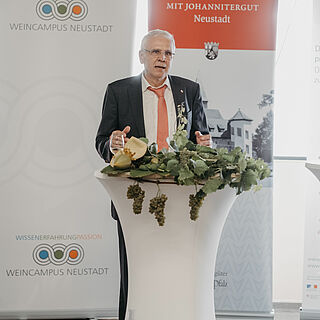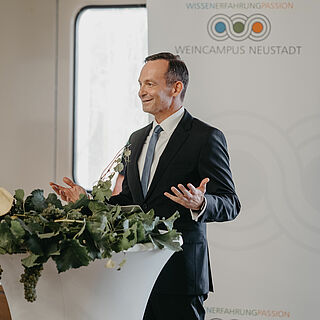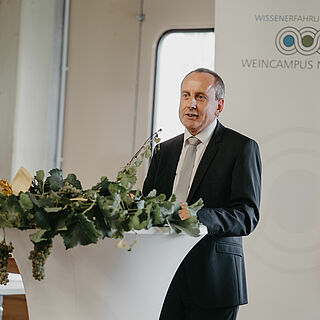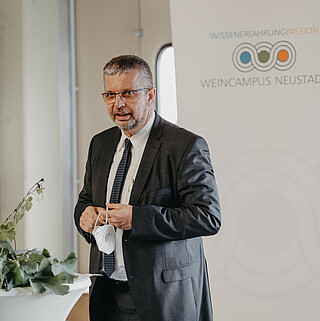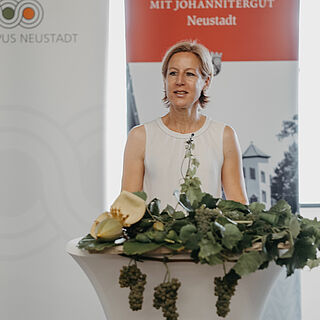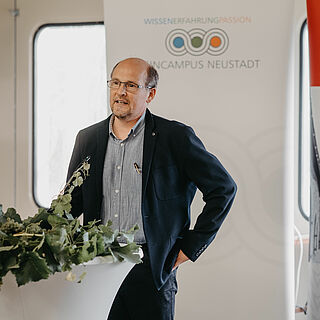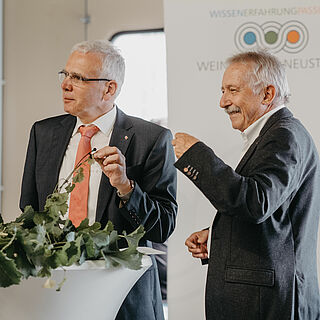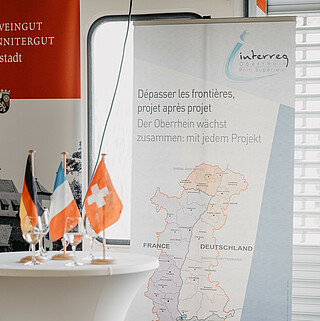Binational degree program supported with 1.5 million euros in EU funding
Minister of Viticulture Dr. Volker Wissing and Minister of Science Prof. Dr. Konrad Wolf honoured the Wine Campus Neustadt with their visit on 11 August 2020 and handed over the letter of approval for around 1.5 million euros in EU funding for the new Franco-German Master's in Viticulture and Enology. The course will be offered from September together with the Université de Haute-Alsace in Colmar. "I am convinced that a new era in the educational history of France and Germany is starting here today and we can say that we have been part of it," emphasized Dr. Günter Hoos, Head of the Rural Area Service Center (DLR) Rhenish Palatinate, which is supporting the project as part of the Wine Campus Neustadt, in his welcoming address.
"This project is tailor-made for the region (...) because we cultivate wine as a cultural asset," said Dr. Volker Wissing, Rhineland-Palatinate's Minister of Viticulture and Economic Affairs, in his address. The state of Rhineland-Palatinate is enthusiastic about the project and the state government is following it with attention and great interest. "If we join forces in Europe, we can create added value, and it is precisely this added value that inspires people. This project is a pan-European project," continued Wissing.
Science Minister Prof. Dr. Konrad Wolf, who initially had the "pleasure" of witnessing and accompanying the "development" and "success" of the Wine Campus as President of Kaiserslautern University of Applied Sciences, spoke of the new Franco-German Master's degree course as the "crowning glory of this development". "This will make the Wine Campus even more international," said the Minister. Studying and working in two or three countries is a real experience of Europe. "Today is a very nice day for all of us," he said.
Werner Schreiner, State Government Commissioner for Cross-border Cooperation, representing Minister President Malu Dreyer, welcomed the presence of two ministers at the event. This shows how important cross-border cooperation is for the state of Rhineland-Palatinate, he said.
About the study program
Representatives from the universities also took part in the event. Prof. Dr. Hans-Joachim Schmidt, President of Kaiserslautern University of Applied Sciences - together with Ludwigshafen and Bingen universities, one of the three supporting universities of the Wine Campus - named the "success factors for the development of such a course". These include the support of the state government, the cooperation between the three universities, the high-performance research, the enthusiasm of the people and the international networking of the location. "All those involved have a shared passion that knows no nationalism. This is the love of wine and this is a wonderful basis for working together and creating something special together," says Schmidt.
Prof. Dr. Maren Scharfenberger-Schmeer, head of the course, presented the project in detail. The binationality, the duality, which ensures the transfer from practice to academia and vice versa through the three practical phases, as well as the curriculum developed jointly with the Université de Haute-Alsace, which focuses on future topics, are the characteristics of the new course. "Language acquisition is integrated into the curriculum," emphasized the Professor of Microbiology.
The Vice President of the Université de Haute-Alsace, Prof. Dr. Alain Dieterlen, also came to Neustadt on this special day. In his speech, he spoke about the European character of his university, which has eleven bi- and tri-national cross-border degree courses, and was delighted to receive funding from the Interreg V A program "Upper Rhine" and the European Regional Development Fund (ERDF). This is a recognition of the work of the educational institutions and an indispensable financial aid for the development of their cooperation.
With this innovative and ambitious project, the Wine Campus Neustadt not only demonstrates its striving for education at a high level and excellence, but also sets an example for internationalization, cross-border cooperation and Franco-German friendship. A milestone has been set.


